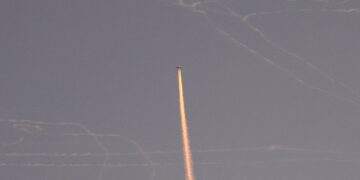TEL AVIV/DUBAI/WASHINGTON (Reuters) -Iran and Israel targeted each other with missiles and airstrikes early on Saturday after Israel launched its biggest-ever air offensive against its longtime foe in a bid to prevent it from developing a nuclear weapon.
Air raid sirens sounded in Tel Aviv and Jerusalem, Israel’s two largest cities, sending residents rushing into shelters as successive waves of Iranian missiles streaked across the skies. The military said its air defence systems were operating.
“In the last hour, dozens of missiles have been launched at the state of Israel from Iran, some of which were intercepted,” the Israeli military said.
It said rescue teams were working at a number of locations across the country where fallen projectiles were reported, without commenting on casualties.
In Iran, several explosions were heard in the capital Tehran, the semi-official Tasnim news agency reported.
The Fars news agency said two projectiles hit Tehran’s Mehrabad airport, and Iranian media said flames were reported there. Close to key Iranian leadership sites, the airport hosts an air force base with fighter jets and transport aircraft.
Israeli media said a suspected missile came down in Tel Aviv, and a Reuters witness heard a loud boom in Jerusalem. It was unclear whether Iranian strikes or Israeli defensive measures were behind the activity.
The Fars news agency said Tehran launched waves of airstrikes on Saturday after two salvos on Friday night. One of the waves targeted Tel Aviv before dawn on Saturday, with explosions heard in the capital and Jerusalem, witnesses said.
Those were in response to Israel’s attacks on Iran early on Friday against commanders, nuclear scientists, military targets and nuclear sites. Iran denies that its uranium enrichment activities are part of a secret weapons programme.
In central Tel Aviv, a high-rise building was hit, damaging the lower third of the structure in a densely populated urban area. An apartment block in nearby Ramat Gan was destroyed.
Israel’s ambulance service said 34 people were injured on Friday night in the Tel Aviv area, most with minor injuries. Police later said one person had died.
The U.S. military helped shoot down Iranian missiles headed for Israel on Friday, two U.S. officials said. Israel’s military said Iran fired fewer than 100 missiles on Friday and that most were intercepted or fell short. Several buildings in and around Tel Aviv were hit.
The Israeli strikes on Iran throughout the day and the Iranian retaliation raised fears of a broader regional conflagration, although Iran’s allies Hamas in Gaza and Hezbollah in Lebanon have been decimated by Israel.
TRUMP SAYS: NOT TOO LATE
Iran’s state news agency IRNA said Tehran launched hundreds of ballistic missiles at Israel after Israel blasted Iran’s huge Natanz underground nuclear site and killed its top military commanders. Iran says its nuclear programme is only for peaceful purposes.
Israeli officials said it may be some time before the extent of damage at Natanz was clear. Western countries have long accused Iran of refining uranium there to levels suitable for a bomb rather than civilian use.
The above-ground pilot enrichment plant at Natanz has been destroyed, U.N. nuclear watchdog chief Rafael Grossi told the Security Council on Friday. He said the U.N. was still gathering information about Israeli attacks on two other facilities, the Fordow fuel enrichment plant and at Isfahan.
Iran’s Supreme Leader Ayatollah Ali Khamenei accused Israel of starting a war. A senior Iranian official said nowhere in Israel would be safe and revenge would be painful.
Iran’s U.N. envoy Amir Saeid Iravani said 78 people, including senior military officials, were killed in Israel’s strikes on Iran and more than 320 people were wounded, most of them civilians.
He accused the U.S. of being complicit in the attacks and said it shared full responsibility for the consequences.
Israel’s U.N. envoy Danny Danon said intelligence had confirmed that within days Iran would have produced enough fissile material for multiple bombs. He called Israel’s operation “an act of national preservation.”
Iran has long insisted its nuclear programme is for civilian purposes only. The U.N. nuclear watchdog concluded this week that it was in violation of its obligations under the global non-proliferation treaty.
U.S. President Donald Trump said it was not too late for Tehran to halt the Israeli bombing campaign by reaching a deal on its nuclear programme.
Tehran had been engaged in talks with the Trump administration on a deal to curb its nuclear programme to replace one that Trump abandoned in 2018. Tehran rejected the last U.S. offer.
The talks are due to resume in Oman on Sunday but Iran signalled it might not join.
“The other side (the U.S.) acted in a way that makes dialogue meaningless,” Iran’s foreign ministry spokesperson said on Friday. “You cannot claim to negotiate and at the same time divide work by allowing the Zionist regime (Israel) to target Iran’s territory.”
(Reporting by Reuters; Writing by Cynthia Osterman and Stephen Coates; Editing by Daniel Wallis and Raju Gopalakrishnan)
By Alexander Cornwell, Parisa Hafezi and Steve Holland















